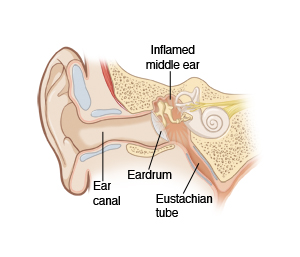Middle Ear Infection (Adult)
You have an infection of the middle ear, the space behind the eardrum. This is also called acute otitis media (AOM). Sometimes it's caused by the common cold. This is because congestion can block the internal passage (eustachian tube) that drains fluid from the middle ear. When the middle ear fills with fluid, bacteria can grow there and cause an infection. Oral antibiotics are used to treat this illness, not eardrops. Symptoms often start to improve within 1 to 2 days of treatment.

Home care
Here are some general care guidelines:
-
Finish all of the antibiotic medicine given, even though you may feel better after the first few days.
-
You may use over-the-counter medicine, such as acetaminophen or ibuprofen, to control pain and fever unless something else was prescribed. Talk with your healthcare provider before using these medicines if you have chronic liver or kidney disease. Also talk with your provider if you've had a stomach ulcer or digestive tract bleeding. Don't give aspirin to anyone under 18 years of age who is ill or has a fever. It may cause a severe illness called Reye syndrome, which may result in brain or liver damage. If not treated correctly, it may cause death.
Follow-up care
Follow up with your healthcare provider as advised. If all symptoms haven't gotten better, or if hearing doesn't go back to normal in 2 weeks, you may need further treatment.
When to get medical advice
Call your healthcare provider right away if any of these occur:
-
Ear pain gets worse or doesn't improve after 3 days of treatment
-
Abnormal drowsiness or confusion
-
Neck pain, stiff neck, or headache
-
Fluid or blood draining from the ear canal
-
Fever of 100.4°F (38°C) or higher, or as advised
-
Seizure
Online Medical Reviewer:
Ashutosh Kacker MD
Online Medical Reviewer:
Rita Sather RN
Online Medical Reviewer:
Tara Novick BSN MSN
Date Last Reviewed:
5/1/2022
© 2000-2025 The StayWell Company, LLC. All rights reserved. This information is not intended as a substitute for professional medical care. Always follow your healthcare professional's instructions.